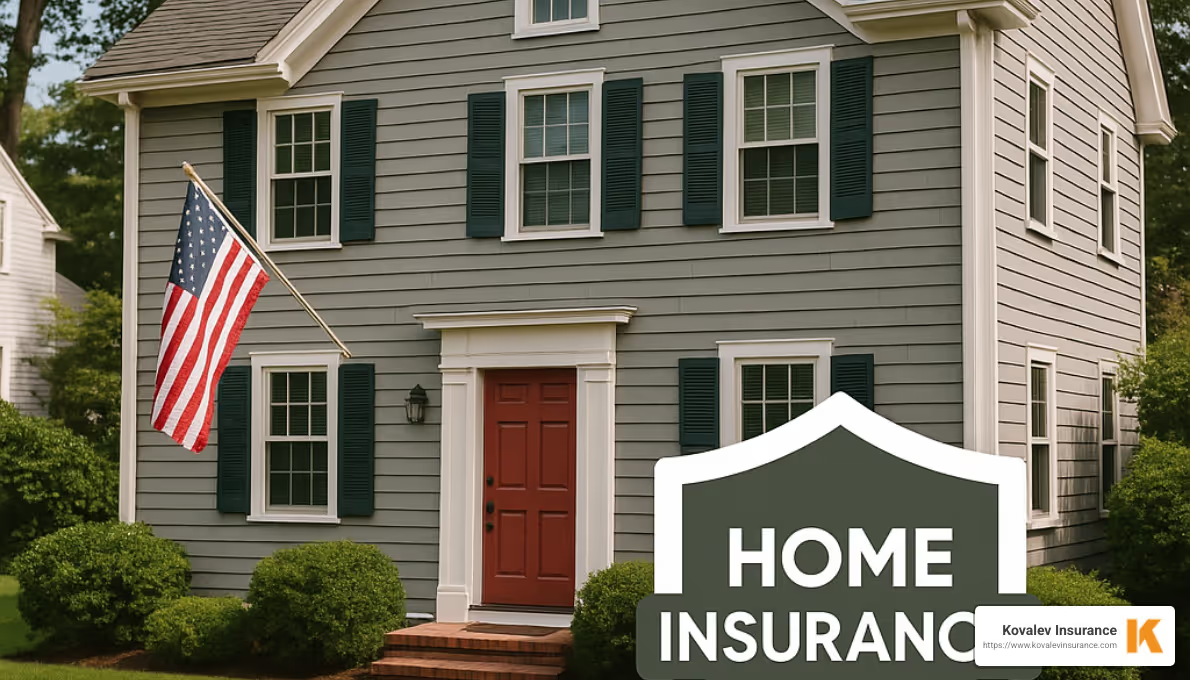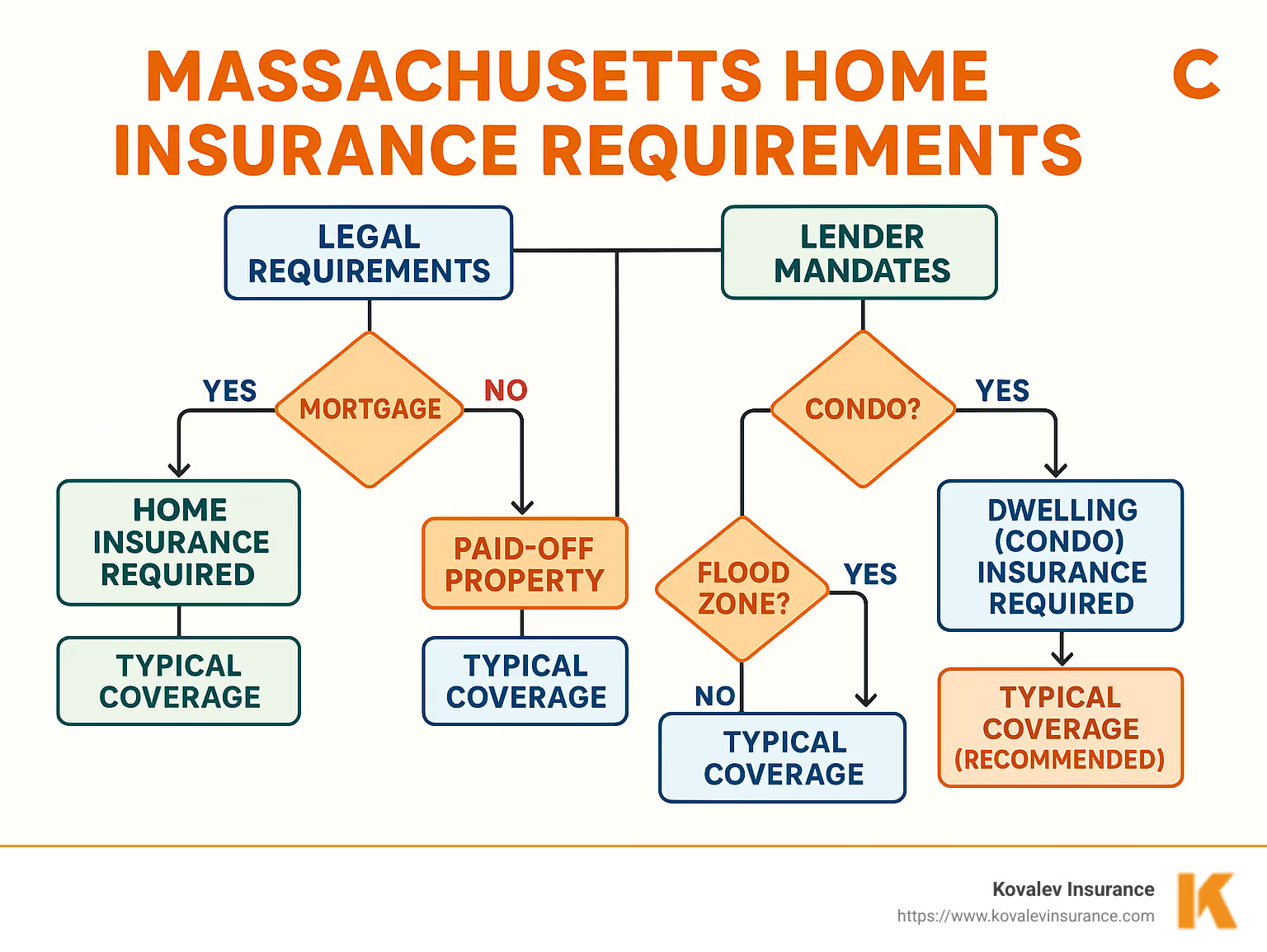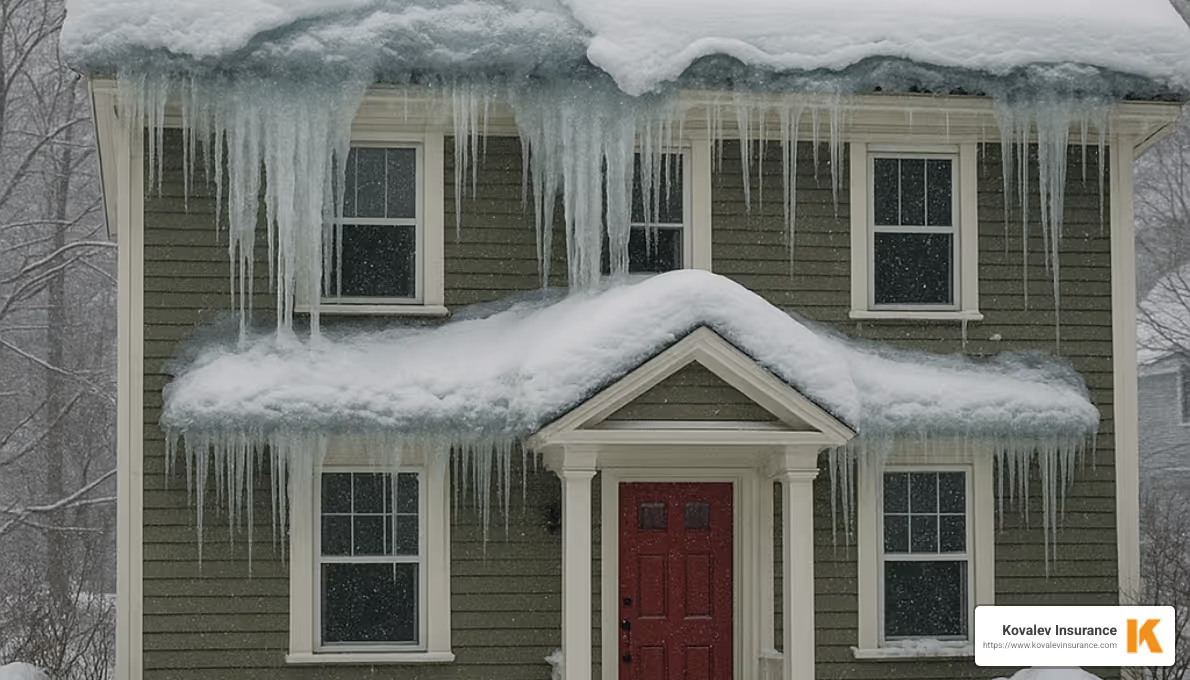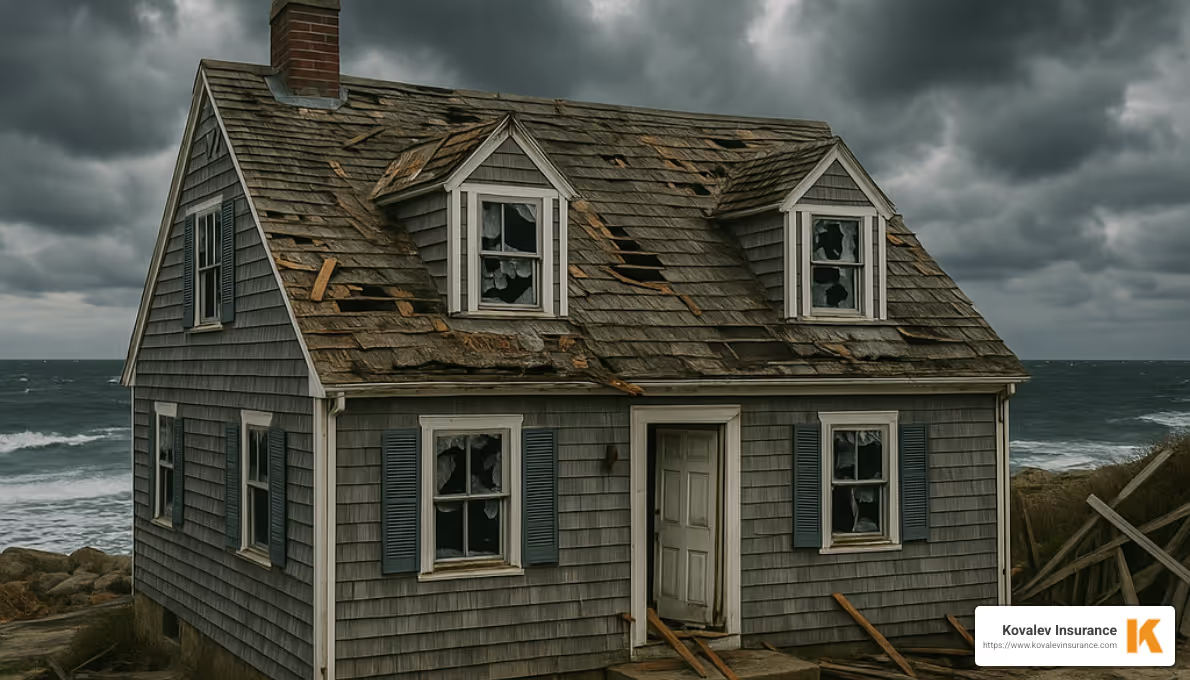Blog Content
14
Sep
2025

Is homeowners insurance required in Massachusetts? The short answer is no—Massachusetts state law doesn't legally require you to insure your home. But before you celebrate this apparent freedom, there's more to the story that every Bay State homeowner should understand.
While the Commonwealth doesn't mandate coverage through any specific statute, most Massachusetts homeowners find themselves needing insurance anyway. If you have a mortgage (and most of us do), your lender will absolutely require you to maintain adequate coverage to protect their investment in your property.
Here's a clear breakdown of when home insurance becomes necessary in Massachusetts:
Living in Massachusetts means facing some unique weather challenges that make insurance particularly valuable. Our homes endure punishing nor'easters that whip coastal communities with wind and rain. Winter brings heavy snow loads, pipe-freezing temperatures, and those notorious ice dams that can turn your ceiling into an indoor waterfall. Without insurance, a single severe weather event could cost you tens of thousands in out-of-pocket repairs.
This is especially true in communities like Newton, Wellesley, and Brookline, where home values significantly exceed national averages. When your home represents such a substantial investment, going without proper insurance coverage isn't just risky—it's potentially devastating to your financial well-being.
For Needham, Belmont, and Natick residents, the same principles apply. Your home likely represents your largest asset, and protecting it shouldn't be optional, regardless of what state law requires.

Looking for more guidance on Massachusetts home insurance? These resources can help you better understand your options:
When it comes to understanding whether is homeowners insurance required in Massachusetts, there's often confusion between what's legally mandatory and what's practically necessary. Let's clear this up with straightforward facts about Massachusetts home insurance requirements.
The simple answer is no. Unlike auto insurance, which Massachusetts law requires all drivers to have, there is no state law or statute that requires homeowners to purchase insurance for their residential property. The Massachusetts Division of Insurance is clear on this point: homeowners insurance is not legally mandated by the Commonwealth.
This means that, technically speaking, you could own a home in Massachusetts without any insurance coverage. However, this distinction is largely academic for most homeowners in Newton, Wellesley, and surrounding communities.
According to the Massachusetts Division of Insurance, "There is no Massachusetts law requiring homeowners insurance, but mortgage lenders typically require it as a condition of your loan." This statement from the state's regulatory authority makes it clear - while the government doesn't mandate coverage, other entities effectively do.
Most homeowners find that even without a state mandate, their mortgage lender will require insurance as part of their loan agreement. This requirement is typically written into your mortgage terms and continues until your loan is paid in full.
If you've paid off your mortgage completely or purchased your home with cash, you are not legally required to carry homeowners insurance in Massachusetts. You have the freedom to "self-insure," meaning you take on all the financial risk yourself.
However, this approach comes with substantial risks, especially in Massachusetts where weather-related perils are common. As the Massachusetts Division of Insurance aptly puts it: "Your home is your castle. It is your most valuable asset."
Without insurance, imagine what would happen if:
In each of these scenarios, you would be responsible for 100% of the costs without insurance. For most Massachusetts homeowners, especially in high-value areas like Newton, Wellesley, and Brookline, these costs could easily reach hundreds of thousands of dollars.
While you technically can go without homeowners insurance if you own your home outright, the real question becomes not "Is it required?" but rather "Can I afford not to have it?" For most homeowners in Belmont, Natick, and throughout Massachusetts, the answer to that second question is a resounding "no."
The bottom line: though not legally required by Massachusetts state law, homeowners insurance becomes effectively mandatory for anyone with a mortgage, and remains a crucial financial protection even for those who own their homes free and clear.
Even though Massachusetts doesn't legally require you to have homeowners insurance, the reality is that most homeowners still need it. Let's explore the situations where insurance becomes effectively mandatory in our Bay State communities.
If you have a mortgage on your Newton or Wellesley home, your lender will absolutely require homeowners insurance. This isn't just a Massachusetts quirk—it's standard practice everywhere, but particularly important in our region where home values are substantial.
Why are lenders so insistent? Well, until you pay off that mortgage, the bank has a significant financial stake in your property. They need to protect their investment if a nor'easter damages your roof or a kitchen fire spreads through your Brookline colonial.
Most Massachusetts mortgage lenders require coverage that at least equals your outstanding loan balance, though I always recommend insuring for the full replacement cost instead. Many local lenders also fold your insurance premiums into monthly escrow payments to ensure coverage stays active throughout your loan term.
Own a condo in Belmont or Natick? Your condo association bylaws likely require you to maintain an HO-6 policy (that's insurance-speak for a condo unit owners policy). This coverage works alongside the association's master policy that covers common areas and the building's structure.
Boston-area condo associations often have detailed insurance requirements written directly into their governing documents. These typically specify minimum liability limits and require coverage for your unit's interior finishes, personal belongings, and potential loss assessments from the association.
Massachusetts has over 1,500 miles of coastline plus countless rivers and streams, making flood risks a serious concern. If your home sits in a designated flood zone and you have a federally-backed mortgage, flood insurance is required in Massachusetts without exception.
Remember: your standard homeowners policy does not cover flood damage. You'll need separate coverage, typically through the National Flood Insurance Program (NFIP) or sometimes through private insurers.
Not sure if you're in a flood zone? Check this flood map from FEMA to see your property's status. With more than half of Massachusetts residents living in coastal communities vulnerable to storm surge and rising sea levels, flood insurance deserves serious consideration even when it's not mandatory.
As the Massachusetts Division of Insurance wisely notes: "Your home is your castle." And in our Commonwealth, that castle faces unique threats that require proper protection.
Taking out a home equity loan or opening a line of credit against your Needham property? The lender will typically require continued homeowners insurance coverage. Just like with your primary mortgage, they need to protect their financial interest in your home.
Even if you've built substantial equity, lenders recognize the risk of significant property damage from our region's weather extremes. A single severe ice dam or basement flood could quickly diminish your property's value, putting their investment at risk.
For a deeper dive into insurance requirements beyond legal mandates, check out our guide on Do You Have to Have Home Insurance? that explores the practical necessities of coverage for Massachusetts homeowners.
Understanding what a standard Massachusetts homeowners policy covers and excludes is crucial to ensuring you're adequately protected against the unique risks we face in the Bay State.

When you open a Massachusetts homeowners policy, you'll find it organized into six standard coverage sections, labeled A through F. Think of these as the foundation of your protection plan.
Coverage A: Dwelling protects the actual structure of your home and anything attached to it, like your garage. For Newton and Wellesley homeowners with historic brownstones or colonials, this coverage is particularly vital during our notorious nor'easters when wind damage is common.
Coverage B: Other Structures extends protection to those standalone structures on your property—the garden shed where you store your snow blower, the detached garage, or that white picket fence surrounding your Brookline property. This typically equals about 10% of your dwelling coverage.
Coverage C: Personal Property covers what makes your house a home—your furniture, clothing, kitchen appliances, and electronics. If a pipe bursts during a Natick winter freeze and soaks your living room, this coverage helps replace your belongings. Most policies set this at 50% of your dwelling coverage.
Coverage D: Loss of Use is your financial safety net if disaster strikes and you can't live in your home during repairs. It covers hotel stays, restaurant meals, and other additional expenses. For Belmont residents dealing with extensive ice dam damage, this coverage (typically 20% of dwelling coverage) can be a lifesaver.
Coverage E: Personal Liability protects your financial future if someone slips on your icy Needham driveway and decides to sue. Standard coverage begins at $100,000, though many Massachusetts homeowners wisely opt for higher limits.
Coverage F: Medical Payments to Others provides a no-fault safety net for minor injuries on your property, typically $1,000-$5,000 per person.
Most Massachusetts homeowners have either an HO-3 policy (which covers your home for all risks except those specifically excluded, but limits personal property coverage to named perils) or the more comprehensive HO-5 policy (which covers both home and belongings against all risks except those specifically excluded).
One particularly valuable coverage for our climate is protection against the weight of ice and snow. After a typical Massachusetts blizzard drops two feet of heavy snow on your roof, this coverage can save you from a financial disaster when structural damage occurs.
"Wait, that's not covered?" Those words are the last thing you want to say after suffering property damage. Yet many Massachusetts homeowners are stunned to find significant gaps in their protection.
Flood damage tops the list of exclusions that surprise Bay State homeowners. Whether it's coastal storm surge in Brookline, rising rivers in Natick, or heavy rainfall overwhelming drainage systems in Newton, standard policies never cover flooding from natural sources. According to Mass.gov, sea-level rise poses an increasing threat to coastal communities, making this exclusion particularly problematic.
Earth movement events like earthquakes, landslides, and sinkholes fall outside standard coverage. While Massachusetts isn't California, we do experience occasional tremors that can damage foundations.
Sewer backup damage is another unpleasant surprise for many homeowners. When heavy rains overwhelm aging infrastructure in historic towns like Wellesley, and sewage backs up into your finished basement, standard policies won't help without specific endorsements.
Mold remediation costs can quickly spiral into tens of thousands of dollars, yet most policies severely limit or exclude this coverage—a significant concern in our humid summers and after winter water damage.
Home-based business activities typically receive minimal protection under standard policies. If you're one of the many Massachusetts professionals who've shifted to working from home, your business equipment and liability exposure may be largely unprotected.
Other common exclusions include power outage spoilage (those groceries that went bad during the last Newton power outage), ordinance or law expenses (bringing century-old Brookline homes up to current building codes after partial damage), and gradual water leaks that cause damage over time.
These exclusions are particularly relevant in Massachusetts, where our unique combination of coastal exposure, severe winter weather, and aging housing stock creates specific vulnerabilities.
The good news is that you can fill many of these coverage gaps by adding endorsements (also called riders) to your policy. Think of these as customization options for your insurance.
A water backup and sump overflow endorsement is practically essential in Massachusetts, where many homes have basements and aging plumbing. For just a modest premium increase, you're protected when sewers back up or sump pumps fail during heavy rainstorms.
Flood insurance requires a separate policy, typically through the National Flood Insurance Program (NFIP) or private insurers. For coastal Belmont properties or Natick homes near water bodies, this coverage isn't optional—it's essential financial protection. Just one inch of floodwater can cause $25,000 in damage.
Extended replacement cost coverage provides a buffer—typically 25-50% above your policy limit—against construction cost surprises. For high-value homes in Wellesley and Newton, where rebuilding costs can exceed market values, this endorsement provides crucial protection.
Scheduled personal property coverage offers improved protection for your valuable items—the family heirlooms, fine art, or jewelry collection that standard policy limits wouldn't adequately cover after a theft.
Newer endorsements like home cyber protection guard against the modern risks of smart home technology. Meanwhile, umbrella liability policies provide extra layers of liability protection beyond your base policy limits—particularly important in affluent communities like Brookline and Newton, where higher net worths can attract larger lawsuits.
For Massachusetts homeowners, selecting the right endorsements isn't about paying for unnecessary coverage—it's about creating a personalized safety net that addresses the specific risks of your property, location, and lifestyle. As the Massachusetts Division of Insurance wisely notes, "Your home is your castle." The right insurance ensures your castle remains protected, no matter what challenges our unique New England climate throws your way.
To learn more about what specific coverages protect Massachusetts homes, check out What Does MA Home Insurance Cover? for a deeper dive into policy details.
Determining the right amount of homeowners insurance coverage in Massachusetts requires balancing protection with affordability. Let's walk through how to find that sweet spot for your home.

If you own a home in Newton, Wellesley, or other affluent Boston suburbs, you're likely sitting on a property worth well over $1 million. But here's something crucial to understand: your insurance coverage should be based on rebuild costs, not market value.
Think about it this way: if your beautiful Wellesley Colonial burned down tomorrow, you wouldn't need to repurchase the land—you already own it. What you'd need is enough money to rebuild the house itself.
Homes in communities like Newton and Brookline typically cost significantly more to rebuild than the state average. A 2,500-square-foot home in these areas might require between $300-$500 per square foot to rebuild—that's $750,000 to $1.25 million just for construction! This higher cost reflects the premium materials, complex architectural details, and higher labor costs in these communities.
I've seen too many Massachusetts homeowners make a critical mistake: underinsuring their homes. If your policy covers less than 80% of your home's replacement cost, you might face a painful surprise called "coinsurance penalty."
For example, if your Newton home would cost $1 million to rebuild, but you only insure for $600,000, and you have a $200,000 kitchen fire, your insurer might only pay $150,000—leaving you $50,000 short. That's not a conversation I enjoy having with clients after a loss.
When it comes to Natick, Needham, and Belmont homes, I almost always recommend replacement cost coverage. Yes, it costs more upfront, but it prevents the heartbreak of finding your claim check won't cover full repairs because your items have depreciated.
As the Massachusetts Division of Insurance wisely puts it: "Insurance is not a bank account where your premiums are stored, but rather is a promise that the insurance company will pay for the costs of any covered risks."
Now for some good news! Massachusetts homeowners have multiple ways to lower their insurance costs while maintaining solid protection.
The multi-policy discount is your best friend—bundling your home and auto insurance with the same company typically saves 20-30% on both policies. For a Brookline homeowner paying the Massachusetts average premium of $1,667 annually, that's over $300 in savings.
Those smart home systems aren't just convenient; they're money-savers too. Installing protective devices like smoke detectors, carbon monoxide alarms, and security systems can trim another 15% off your premium. I've helped Belmont clients save hundreds annually just by upgrading to monitored security systems.
Being claim-free pays off—literally. Most Massachusetts insurers reward homeowners who haven't filed claims in 3-5 years with discounts of 5-10%. This is why I sometimes advise Natick homeowners to think twice before filing small claims.
Roof upgrades deserve special mention for Massachusetts homes. Our brutal winters with heavy snow, ice dams, and freeze-thaw cycles are rough on roofs. Installing impact-resistant roofing materials not only protects your home better but can also earn you a nice discount.
For our senior homeowners in Newton and Wellesley, many insurers offer age-based discounts starting at age 55 or 65. When combined with other discounts, these can make quality coverage much more affordable on a fixed income.
Even small actions like enrolling in paperless billing and automatic payments can save 2-5%. It may not sound like much, but combined with other discounts, these small savings add up.
Massachusetts homeowners pay more than the national average for insurance—$1,667 versus $1,311 nationally—but with the right combination of discounts, you can bring that number down significantly while maintaining the protection your home deserves.
Finding yourself without homeowners insurance in Massachusetts can be a frightening prospect. Whether you've received a non-renewal notice or can't find a company willing to insure your property, this situation demands immediate attention – especially in our state where weather risks are substantial.

Many Massachusetts homeowners face insurance challenges for understandable reasons. You might live in a beautiful but high-risk Cape Cod coastal area where storm surge is a growing concern. Perhaps you've filed multiple claims after those back-to-back nor'easters a few years ago. Maybe your charming 1920s Newton Colonial has knob-and-tube wiring that makes insurers nervous. Or it could be that your insurance score (partially based on credit history) has taken a hit during tough financial times.
Whatever the reason, Massachusetts has systems in place to help you maintain coverage.
If you receive that dreaded non-renewal letter, don't panic. Massachusetts law provides important consumer protections by requiring insurers to give you at least 45 days' notice before non-renewing your policy. This six-week window gives you critical time to shop for alternatives.
For mid-term cancellations (which can only happen for specific reasons like non-payment or fraud), the notification requirements are even stricter. Insurers must provide 5-10 days' notice directly to you and 20 days' notice to any mortgage holder. This extra protection for mortgage holders helps prevent scenarios where your lender is caught off-guard by a lapse in coverage.
"I received a non-renewal notice for my Belmont home after 20 years with the same company due to 'coastal exposure' – even though we're miles inland," shared one local homeowner. "Thankfully, the 45-day notice gave me enough time to find even better coverage with a different carrier."
If you believe your policy was improperly non-renewed or cancelled, don't hesitate to file a complaint with the Massachusetts Division of Insurance. They're there to enforce these protections.
When standard insurers say no, the Massachusetts Property Insurance Underwriting Association (MPIUA) – better known as the FAIR Plan – becomes your safety net. Think of it as our state's insurance program of last resort.
The FAIR Plan provides basic coverage protecting against common perils including fire and lightning, windstorm and hail, explosion, theft, and the weight of ice and snow – a particularly important coverage for Massachusetts winters. The plan covers most of the essentials, though the coverage isn't as comprehensive as what you'd typically get in the standard market.
Brookline resident Maria found herself turning to the FAIR Plan after three standard insurers declined to cover her home due to its location in a flood-prone area. "The premiums were higher than I wanted to pay," she admits, "but the peace of mind knowing my biggest investment was protected was worth it."
To qualify for the FAIR Plan, you'll need to demonstrate that you've been denied coverage by at least three standard market insurers. You can reach them at (617) 723-3800 or toll-free at 1-800-392-6108, or visit their website at www.mpiua.com.
One important consideration: FAIR Plan policies often come with higher premiums and may have coverage limits that fall short for higher-value homes in affluent communities like Wellesley or Newton, where replacement costs can easily exceed $1 million.
Another option when standard coverage isn't available is surplus lines insurance. These policies come from insurers not formally licensed in Massachusetts but permitted to operate under special conditions.
Surplus lines carriers specialize in unusual or high-risk properties – like that gorgeous oceanfront Natick Lake house or your historic Needham property with unique architectural features. While these policies can provide custom coverage when standard insurers won't touch your property, they typically come with premium prices.
One critical note: surplus lines policies aren't backed by the Massachusetts Guaranty Fund, which protects policyholders if an insurer becomes insolvent. This means you're taking on slightly more risk with these policies.
Sometimes the best approach is making your property more insurable. Consider these proven risk reduction strategies:
Modernize critical systems in your home. Updating outdated electrical, plumbing, and heating systems not only makes your home safer but signals to insurers that you're a responsible homeowner. In older Brookline and Newton homes, this often means replacing knob-and-tube wiring and cast iron pipes.
Weatherproof your property against Massachusetts' unique challenges. Install storm shutters, reinforce your roof to better handle snow loads, and improve drainage around your foundation to prevent ice dam damage and basement flooding.
Boost your home's safety profile with smoke detectors, carbon monoxide alarms, and security systems. Many homes in Wellesley and Newton have upgraded to smart home security systems that can detect water leaks, fire, and break-ins – all features that insurers love to see.
Consider accepting higher deductibles if it means maintaining coverage. While you'll pay more out-of-pocket for claims, having a $2,500 or $5,000 deductible is far better than having no coverage at all when a major loss occurs.
As the Massachusetts Division of Insurance wisely notes: "An ounce of prevention is worth a pound of cure." This old saying rings especially true for homeowners in our state, where taking proactive steps to reduce your home's risk profile can make the difference between being insurable and uninsurable.
While homeowners insurance is not required in Massachusetts by law, going without coverage puts your most valuable asset at tremendous risk. With persistence and the right strategies, most Massachusetts homeowners can find appropriate coverage, even in challenging circumstances.
Letting your homeowners insurance lapse while you still have a mortgage is a bit like forgetting to lock your front door in a neighborhood known for break-ins—it creates unnecessary risk and triggers immediate consequences.
If your policy lapses, your mortgage lender won't simply shrug and hope for the best. Instead, they'll quickly step in to protect their investment by purchasing what's called "force-placed" or "lender-placed" insurance on your behalf. And yes, they'll be sending you the bill.
These force-placed policies typically cost 2-3 times more than what you'd pay for standard coverage. Even worse, they provide dramatically less protection, focusing primarily on the structure itself (the lender's main concern) while offering little to no coverage for your personal belongings or liability protection.
As one Newton homeowner finded last winter: "My policy lapsed for just three weeks, and suddenly my mortgage payment jumped by $300 per month. The force-placed coverage cost more and protected less—it was a lose-lose situation."
The Massachusetts Division of Insurance notes that while "the lender cannot require you to obtain coverage from any particular insurer," they absolutely can and will ensure some form of protection is in place—even if it's not in your best financial interest.
To avoid this expensive headache, set up automatic payments, respond promptly to renewal notices, and keep your contact information updated with your insurance company.
Yes, Massachusetts insurers have considerable latitude in their underwriting decisions, including the ability to decline coverage based on factors like your furry family members or your claims history.
Dog breed restrictions are common among Massachusetts insurers. Many companies maintain lists of breeds they consider high-risk, including pit bulls, Rottweilers, German shepherds, and wolf hybrids. If you share your Wellesley or Brookline home with one of these breeds, you might face higher premiums or even outright rejection from some insurance companies.
However, you're not without options. Many dog owners have successfully addressed these concerns by:
Your claims history also plays a significant role in insurability. Multiple claims within a 3-5 year period can raise red flags for insurers, potentially leading to non-renewal or premium increases. This is especially true for water damage claims, which are common in older Brookline and Newton homes with aging plumbing systems.
It's worth noting that Massachusetts does provide some consumer protections. State law prohibits insurers from using factors like "race, color, religious creed, national origin, sex, age, ancestry, sexual orientation, children, marital status, veteran status, public assistance status, or disability" in their underwriting decisions.
In Massachusetts, homeowners receive important consumer protections regarding policy cancellations and non-renewals. If your insurer decides not to renew your policy at the end of its term, they must provide you with at least 45 days' written notice before your coverage expires.
This 45-day window is designed to give you adequate time to shop for new coverage—and in communities like Natick and Belmont where winter weather can complicate home inspections, you'll want every day of that shopping period.
For mid-term cancellations (which can only happen for specific reasons like non-payment or fraud), the notice requirements are stricter:
If you receive a cancellation or non-renewal notice, don't panic, but don't delay either. First, contact your insurer to understand exactly why they've made this decision. Sometimes simple misunderstandings or fixable issues are at the root of the problem.
"I received a non-renewal notice last spring," shares a Needham homeowner. "When I called my agent, I finded it was because of two small claims and an aging roof. By agreeing to replace my roof, I was able to maintain my coverage without interruption."
If you believe your non-renewal violates Massachusetts regulations, the Division of Insurance can help. Their consumer hotline (617-521-7794) provides guidance on your rights and the appeals process.
During the first 60 days of a new policy, insurers have broader authority to cancel coverage—another reason why securing continuous, appropriate coverage from a trusted local agency is so important for Massachusetts homeowners.
While homeowners insurance is not required by Massachusetts state law, most homeowners need it anyway due to mortgage requirements, condo association rules, or flood zone regulations. Even if you own your home outright, going without insurance leaves you financially vulnerable, especially considering our unique Massachusetts weather challenges—from nor'easters to ice dams to coastal flooding.
A well-designed Massachusetts homeowners policy should include:
Dwelling coverage that reflects the true cost to rebuild your home, not just its market value. This is particularly important in communities like Newton and Wellesley, where construction costs continue to climb. Many local homeowners benefit from an extended replacement cost endorsement that provides an extra cushion (typically 25-50%) above your policy limit.
Water-related protections are essential in our region too. Consider adding water backup coverage to protect against sewer backups and failed sump pumps—common issues in older Massachusetts homes. And if you're anywhere near the coast or a floodplain, separate flood insurance deserves serious consideration.
For high-value homes throughout Greater Boston, don't overlook proper protection for your belongings. Standard coverage limits for jewelry, art, and collectibles are often insufficient for the treasures found in Brookline and Wellesley homes. Scheduled personal property endorsements provide the extra protection these items deserve.

Now is the perfect time to review your homeowners insurance coverage—especially with rebuilding costs increasing dramatically in recent years. Pull out your policy and check if your dwelling coverage still makes sense given today's construction prices in Natick, Needham, and surrounding communities.
Think about your home's specific risk factors. Do you have an older roof that might be vulnerable to our heavy winter snow loads? Is your finished basement protected against water damage? Are those beautiful mature trees on your Belmont property properly covered if they fall during a storm?
Don't forget to ask about discounts! Many Massachusetts homeowners don't realize they qualify for significant savings through bundling policies, installing smart home security systems, or maintaining a claim-free history. These discounts can add up to hundreds of dollars annually.
Most importantly, consider working with an insurance professional who truly understands Massachusetts' unique insurance landscape. Local expertise matters when it comes to identifying the specific risks that affect homes in Newton versus Natick, or coastal properties versus those further inland.
At Kovalev Insurance, we specialize in helping homeowners throughout Greater Boston steer these complex decisions. Our team's deep understanding of local risks ensures that you receive protection custom to your specific needs—whether you're in a historic Brookline brownstone or a modern Wellesley colonial.
While Massachusetts doesn't legally require you to insure your home, doing so protects what is likely your largest investment. As the Massachusetts Division of Insurance wisely notes: "Your home is your castle." Make sure that castle has the proper walls of protection around it.
Contact Kovalev for the best home insurance rates in Massachusetts.
X